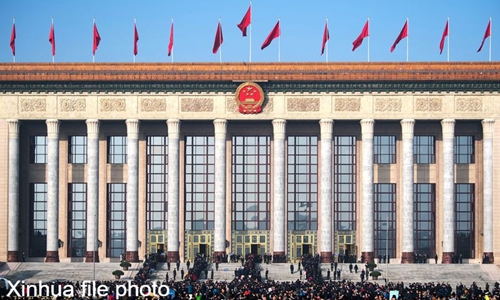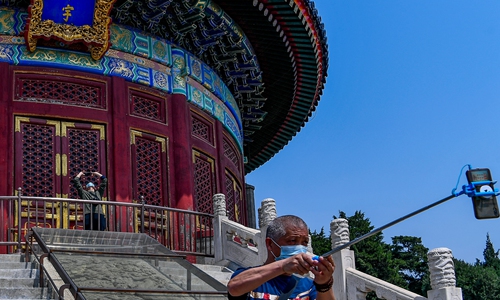China may shorten 2020 'two sessions' rescheduled in late May: insider
Meetings may be shorter due to COVID-19 epidemic

Photo:Xinhua
China will hold its most important political events - the plenary session of the National People's Congress (NPC) and the annual session of the National Committee of the Chinese People's Political Consultative Conference (CPPCC) - also known as the "two sessions," in late May, which shows that the COVID-19 epidemic in China is fully under control.

Flags displayed at Tian'anmen Square and atop the Great Hall of the People in downtown Beijing. Photo: VCG
NPC deputies and CPPCC members scheduled to attend the annual events said this year's two sessions might be shorter due to the impact of the epidemic.
The third plenary session of the 13th NPC will convene on May 22 in Beijing, according to a decision made by the NPC Standing Committee on Wednesday morning. The decision on the opening date of this year's NPC session was adopted at the bimonthly meeting of the NPC Standing Committee as control over the epidemic situation in China has ensured that the economic and social life can go back to normal gradually.
It was proposed that the third annual session of the 13th National Committee of the CPPCC open in Beijing on May 21. The recommendation was made at a recent meeting held by the Chairperson's Council of the CPPCC National Committee.
Zhou Hong, a deputy to the NPC and a research fellow at the Chinese Academy of Social Sciences, believes that the timing of the two sessions signals the staged triumph of the nationwide fight against the coronavirus epidemic, which initially led to the postponement of the two key meetings.
She also noted that the victory was achieved because the advantages of China's socialist system have played a vital role in the country's epidemic prevention and control efforts.
On December 28, 2019, the NPC Standing Committee planned to convene its plenary session on March 5. Later, due to the COVID-19 epidemic, the NPC Standing Committee decided on February 24 to postpone the session.
During the NPC session, about 3,000 national legislators from various walks of life gather in Beijing to review work reports from the central government as well as the country's supreme court and procuratorate, the national budget, and the national economic and social development plan.
As the epidemic situation in China remains to be finalized, the meetings could be affected. But attendees of the two sessions reached by the Global Times said they are still waiting for more detailed arrangements for them to come from their own provinces to Beijing, including whether they will arrive by chartered flights or if they will have to go through a 14-day quarantine.
Hu Shengyun, a senior rocket engineer at the China Aerospace Science and Industry Corporation and a deputy to the 13th National People's Congress from Wuhan, capital of Central China's Hubei Province, told the Global Times that he just learned the exact date on Wednesday morning and had not received any notice from the provincial's organizing committee.
As a deputy from Wuhan, a city hit hardest by the COVID-19 epidemic, he is anxious to know more about the details and medical procedures that he needs to undergo before coming to Beijing.
A few hours after the dates for the two sessions were announced, Beijing announced to lower its epidemic emergency response from the top level to level II, taking effect from Thursday, after the capital city recorded zero new imported and domestically transmitted cases for 13 consecutive days.

Tourists take selfies and photos at the centuries-old Temple of Heaven in Beijing on Wednesday. The Chinese capital has announced to downgrade its emergency response to the COVID-19 pandemic from Level I to Level II. Photo: IC
On Wednesday's press conference, officials from Beijing municipal government announced that the city will not require domestic arrivals to provide a negative nucleic acid report before checking into hotels as long as they can present the green health code.
The capital city also lifted the 14-day quarantine requirement for people from other low-risk areas in China. But the requirement remains in place for people from Hubei Province and medium- and high-risk areas as well as international arrivals.
The announcement of the two sessions' opening dates has delivered high confidence to the residents in Beijing as they believe that this is a signal that the epidemic situation in the capital city is being under control. Their lives can finally go back to normal after the two sessions end. Some web users speculate that they could probably take off their masks after the two sessions.
"The dates are finally confirmed, and it is good news for everyone in this city. Beijing always keeps higher alert than other cities, and the control measures are also stricter than in other places. They [the authorities] need to prepare for the most important annual political events, so now we could probably expect our daily lives to return normal in June," said a Beijing resident surnamed Chu, 48, who lives in the Haidian district of the city.
Different from the past
Yung Chan, an NPC deputy and the vice-chairman of the Democratic Alliance for the Betterment and Progress of Hong Kong, said that the annual political meetings would be shorter this year in the wake of the coronavirus epidemic.
Some NPC deputies and members of the CPPCC National Committee have heard that the meetings would be shorter due to concerns over epidemic prevention and control. Witman Hung Wai-man, a Hong Kong deputy to the 13th NPC, and Zhu Zhengfu, a prominent Chinese lawyer and a CPPCC member, told the Global Times that the meetings might be shortened to seven days.
Some NPC deputies said they are waiting for more notices as they are preparing their proposals, and they will adjust their work schedules to meet the changing epidemic situation.
Many said that they have also prepared several motions and proposals related to the health crisis, as the coronavirus outbreak has left Chinese people a most unforgettable spring.
A member from a local committee for organizing NPC deputies and CPPCC National Committee members to come to Beijing said on condition of anonymity that they are required to update their health conditions including body temperature, information on places they have been to and people they have contacted on an online platform. They have been arranged to undergo nucleic acid tests and if the results come back negative, they will book group tickets for Beijing and stay in a designated hotel.
"We are required not to come into contact with irrelevant personnel until the two sessions end," the organizing committee member said.
Foreign reporters also expressed their anticipation of coming to Beijing to cover the meetings.
A Pakistani reporter who covered the meetings last year said that he usually received the invitation letter a month before the event, but has not received any notice so far. Another reporter in Japan who has covered the meetings for several years said that he is worried that he will be quarantined for 14 days and is currently coordinating with Chinese authorities.
"Reporters from foreign media as well as overseas Chinese delegates who are invited to give advice at the CPPCC National Committee session will face a problem," the Japanese reporter said.
The two foreign reporters talked to the Global Times on condition of anonymity.
Currently, international arrivals bound for Beijing will be diverted to 12 designated entry ports in nearby cities, and all arrivals must receive nucleic acid tests and undergo 14-day quarantines.
Proposals and hot issues
Hot issues in previous years, such as China's GDP target and the annual Chinese military budget, would also attract attention worldwide. Still, due to the impact of the COVID-19 epidemic, experts warned that the expectations should be pragmatic this year.
"It is not appropriate to take GDP growth as the target of China's economy this year," said Tian Yun, vice director of the Beijing Economic Operation Association.
He attributed to the fact that people do not have a clear understanding of the virus, and the world is still in a struggle to fight against the virus, which has put uncertainties on the Chinese economy.
He suggested that the government take the jobless rate and the residents' salary income as the targets, for "they are more practical to realize."
China's military budget for 2020 could maintain a steady increase even though foreign reports have suggested that an economic crisis caused by the COVID-19 pandemic will hit military spending. Still, a slight decrease is also possible, Chinese military experts said.
The defense budget may grow more slowly than in 2019, rising to about 1.27 trillion yuan ($179 billion), or it may fall to only 1 trillion yuan, analysts predicted.
Tian predicted that the yearly GDP growth target in China could be around zero to 3 percent, and the 3 percent growth is based on the second quarter GDP performance to see if it could realize a positive growth.
Focus on economic development
Participants of the "two sessions" revealed on Wednesday that this year's meetings will focus on post-epidemic efforts from all walks of life.
Zhu the lawyer revealed that he will submit a proposal suggesting the central government give every citizen an epidemic subsidy of 2,000 yuan ($283), to relieve difficulties and stimulate economic development.
Lian Yuming, head of the Beijing-based Global City Development Corporation Council, said that he has proposed a plan to secure personal data during public health emergencies. He also proposed suggestions aimed at post-epidemic poverty alleviation to help the country achieve its goal of becoming an all-round well-off society by the end of 2020.
